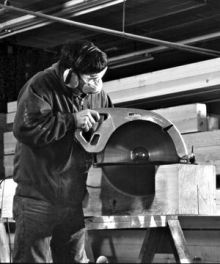Ukrainian buyers of timber are in for a new system of initial price formation at open auctions, State Forest Agency Chairman Viktor Sivets announced after a meeting with representatives of the woodworking industry.
But the state is unlikely to begin trading wood at new starting prices in 2011. Ukraine’s First Vice-Premier Andrii Kliuiev has instructed a forestry research institute under the Ministry of Economics to draw up a new procedure. And until then, throughout the fourth quarter of 2011, woodworking facilities will be purchasing the raw wood harvested by state-run forestry companies at the prices formed in the third quarter of 2011, Sivets said. It will be recalled that the raw wood price was raised by an average 10-15 percent at the third quarter auction. On the other hand, he says, the producers made a commitment not to raise the price for furniture manufacturers.
By this decision, the state and the woodworkers showed that they have reached mutual understanding after a lengthy debate. Incidentally, the producers had been complaining earlier that they could not buy enough national raw materials on the domestic market and, besides, that prices have been too stiff lately. But Sivets said in an interview with The Day that these reproaches were unfounded and the increase of wood purchasing prices was an objective factor. In his words, the cost of Ukrainian timber was much lower than that of the same commodity in other countries. He cited, as an example, the prices policy in Poland and Hungary, where furniture factory owners (who, incidentally, also have factories in Ukraine) work differently. “In those countries, raw wood has long been bought at auctions only, but the price of timber is 45-50 euros per cubic meter. In Ukraine, though, furniture manufacturers used to buy unprocessed wood for 10-15 dollars before the introduction of auctions, and now they are doing this for 22 euros at auctions. So furniture producers do not want to pay an actual price for legal wood. This in turn brought forth slogans about the demise of lumbering, shortage of timber, and reverting to direct contracts with wood harvesters,” Sivets explains.
Now, according to the debaters, the dialogue has begun to assume a constructive shape. In the view of Serhii Sahal, president of the Mebelderevoprom association, the new system of initial price formation will solve the problem of the actual prime cost of timber and will improve the sector in general. “There is a downward tendency in the output this year,” he says. In the words of Sahal, the growth in the output of timber and wood items was 34 percent at the beginning of the year and only 10 percent in August. What will be in September is anybody’s guess. It is a very important warning because 90 percent of all the raw wood consumed by woodworkers is of Ukrainian origin. Furniture prices have already risen by 15 percent since the beginning of the year, so keeping the cost of raw wood intact will help maintain furniture prices at the current level until the end of 2011, Sahal says.
Sahal also believes that the new mechanism will insure woodworkers and furniture producers against abrupt price fluctuations which may just ruin national lumbering. “What does it mean when the price shoots up by 60 percent in six months? It means market disruption. No stock exchange will allow this kind of quotations because there are price corridors,” Sahal explains. He says that in other countries forestry committees set a 5-7-percent price growth limit for a certain period. If supplies exceed the norm, this will undermine the market, the expert adds. But there is no such practice in Ukraine, and the initial price at an auction is pegged to nothing. State-run forestry companies make price offers by themselves, while, for example, in the neighboring Belarus prices are offered on the basis of stock-exchange quotations. In Sahal’s view, if prices were formed at the previous auction, the initial price cannot and must not exceed them by 20 percent during the next bidding.
To tell the truth, neither the State Forest Agency nor the abovementioned association venture to forecast the way the initial price will be formed or its size. Let the forestry research institute do this, they say.







